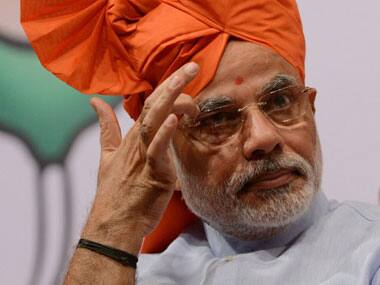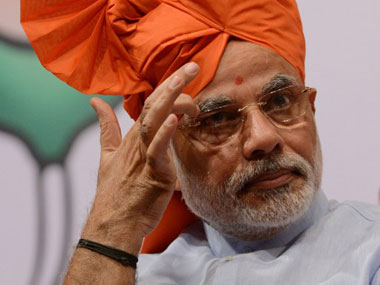Indian politics,
says Pratap Bhanu Mehta,
is not plagued by too much confrontation, but a covert consensus. He also surmises that the real political and economic consensus on most issues makes it important for there to be a confrontational attitude to individuals. Our politics is thus about confrontational personalities, not opposing ideologies or policies. A classic example is that of Narendra Modi. There is now a universal outward consensus against him between the ruling party at the centre and the various other opposition parties in centre and states. But the opposition is to him as an individual, even though it is couched as a consensus in favour of secularism. Why else would Nitish Kumar say Advani-Good-Modi-Bad when the former is the ideological father of the Ram mandir movement that brought leaders like Modi to the fore? If Modi stands in splendid isolation today, it would appear that he represents a break from the consensual leader. But once again the disagreement over Modi is all about optics. He is criticised as arrogant and a one-man show, but once again there is a hidden consensus in all political parties that effectively endorses Modi-like arrogance and one-person shows. Consider the imperiousness of a Mayawati. She will talk to the media when she chooses to and no inconvenient questions will be entertained. Consider the touchy isolation of Mamata Banerjee. Is the Trinamool anything other than a one-woman show? [caption id=“attachment_890305” align=“alignleft” width=“380”]
 Modi is no different from any other political leader. AFP[/caption] Ditto for Jayalalithaa. And ditto even for Nitish Kumar.
Read Jaya Jaitley’s article
in The Indian Express on how Nitish treated George Fernandes and got him defeated. Read also about how he has reduced Sharad Yadav to a cipher. The Janata Dal (United) is about Nitish and no one else, just as the Gujarat BJP is about Modi. Fullstop. Then consider the Sonia-Rahul duo. Neither will descend from their palaces except for their own purposes. Neither is called arrogant by anyone in the media, but their decision to stay in isolation and refusal to be questioned for anything reeks of arrogance in reality. So we can see two kinds of consensus here: a real consensus that in Indian politics, only one person should call the shots. And the other is that every person in power should wear an outward garb of humility, never mind whether this humility is genuine or fake. Why even Modi kept his alleged arrogance aside when he sought Keshubhai Patel’s blessing after winning last December’s Gujarat elections and, more recently, his visit to LK Advani. It may be fair to presume that Modi does not think much of Advani’s current role in the party, but that did not prevent him from displaying public reverence to the elder statesman. Mehta’s insight that we build our politics around personalities rather than policy is largely true. The Congress tomtoms growth, just like Modi, but will talk aam aadmi welfarism too. The BJP is not a study in contrasts. It will oppose the Food Security Bill not for its mindless populism, but for not being even more generous in handouts to the alleged poor. Barring historical differences, the Gujarat model of development and the Kerala model are no different - both are led by private spending and investment. But we take positions on the two models because of the personalities associated with them. Look closely at the Bihar model and it will probably be the same: Nitish Kumar’s boast is also about topping the growth league, not removal of poverty. Consider the real consensus among parties even when there is heated outward disagreement. In theory, the upper caste-led BJP should want less quotas, but the party helped the Congress pass the quotas in promotions bill in the Rajya Sabha, much to the consternation in its Uttar Pradesh unit. It is now led by an OBC leader who earlier was not willing to flaunt his caste. To take the party ahead in UP and Bihar, Modi may allow his caste to be played out. It is also instructive to note that the entire mandir movement had OBCs in the vanguard: from Uma Bharati to Kalyan Singh to Vinay Katiyar. If Mehta’s logic holds, even the consensus against Modi may be ephemeral: it will hold only if Modi takes his party to defeat. If he fares well, opinion on him will change. The one thing on which all Indian politicians have another hidden consensus is this: if you have the numbers I will change my tune. Power builds consensus like nothing else. Narendra Modi’s splendid isolation will end the day he demonstrates power in numbers. The right excuses will be found to align with him when that happens.
Modi is no different from any other political leader. AFP[/caption] Ditto for Jayalalithaa. And ditto even for Nitish Kumar.
Read Jaya Jaitley’s article
in The Indian Express on how Nitish treated George Fernandes and got him defeated. Read also about how he has reduced Sharad Yadav to a cipher. The Janata Dal (United) is about Nitish and no one else, just as the Gujarat BJP is about Modi. Fullstop. Then consider the Sonia-Rahul duo. Neither will descend from their palaces except for their own purposes. Neither is called arrogant by anyone in the media, but their decision to stay in isolation and refusal to be questioned for anything reeks of arrogance in reality. So we can see two kinds of consensus here: a real consensus that in Indian politics, only one person should call the shots. And the other is that every person in power should wear an outward garb of humility, never mind whether this humility is genuine or fake. Why even Modi kept his alleged arrogance aside when he sought Keshubhai Patel’s blessing after winning last December’s Gujarat elections and, more recently, his visit to LK Advani. It may be fair to presume that Modi does not think much of Advani’s current role in the party, but that did not prevent him from displaying public reverence to the elder statesman. Mehta’s insight that we build our politics around personalities rather than policy is largely true. The Congress tomtoms growth, just like Modi, but will talk aam aadmi welfarism too. The BJP is not a study in contrasts. It will oppose the Food Security Bill not for its mindless populism, but for not being even more generous in handouts to the alleged poor. Barring historical differences, the Gujarat model of development and the Kerala model are no different - both are led by private spending and investment. But we take positions on the two models because of the personalities associated with them. Look closely at the Bihar model and it will probably be the same: Nitish Kumar’s boast is also about topping the growth league, not removal of poverty. Consider the real consensus among parties even when there is heated outward disagreement. In theory, the upper caste-led BJP should want less quotas, but the party helped the Congress pass the quotas in promotions bill in the Rajya Sabha, much to the consternation in its Uttar Pradesh unit. It is now led by an OBC leader who earlier was not willing to flaunt his caste. To take the party ahead in UP and Bihar, Modi may allow his caste to be played out. It is also instructive to note that the entire mandir movement had OBCs in the vanguard: from Uma Bharati to Kalyan Singh to Vinay Katiyar. If Mehta’s logic holds, even the consensus against Modi may be ephemeral: it will hold only if Modi takes his party to defeat. If he fares well, opinion on him will change. The one thing on which all Indian politicians have another hidden consensus is this: if you have the numbers I will change my tune. Power builds consensus like nothing else. Narendra Modi’s splendid isolation will end the day he demonstrates power in numbers. The right excuses will be found to align with him when that happens.
Why the political isolation of Narendra Modi is temporary
R Jagannathan
• June 20, 2013, 12:21:44 IST
If Modi stands in splendid isolation today, it would appear that he represents a break from the consensual leader. But once again the disagreement over Modi is all about optics.
Advertisement
)